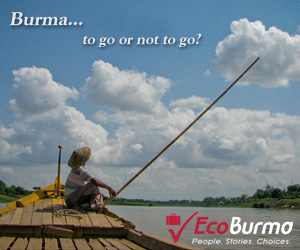In 2010 the Support Burmese Refugees Network in Delhi produced a video with the help of a microgrant received from Burma Center Prague. It focuses on the health care needs of Burmese refugees in Delhi.
Food from the garbage
The video depicts and describes how the Burmese refugees are living in very poor and cramped conditions and many have had to resort to taking rotten food from the market rubbish bins in order to feed themselves. These conditions, combined with the lack of adequate health care services, have helped create a continuing cycle of deteriorating health for them. The main diseases they suffer from are hepatitis, jaundice, cholera, and HIV/AIDS. Despite this they receive very little support from the Indian government or the UNHCR.
“We need more help”
Thankfully for the Burmese there are two health clinics which provide them with access to free health care. One of these is Yamuna, founded by Dr. Tint Swe.
The Yamuna clinic provides essential support in particular to women and children, providing maternity and other services. But the clinic needs more funds in order to have sufficient medicines and equipment. They are only open three days a week despite the growing need of the Burmese community. Dr. Tint Swe’s clinic receives 60 to 90 patients every day they are open. He says: “We need more help from other sympathisers”.
Insufficient medicines
The clinics do not have sufficient medicines and medicine is often prohibitively expensive for the refugees. One woman describes the costs for her father who is suspected to be sick with dengue fever: “We need to spend Rs 3000 to 4000 every week just for buying medicines. I wish and request any organizations and people of goodwill to help us.“
(Rs 3000 to 4000 is in the range of 1,400 Czech crowns).
The free medical clinics are a ‘relief’ to Burmese patients
The health clinics are therefore hugely important for the Burmese refugees. As one patient describes she was “very relieved” to have access to the clinic. “This is the only option for us to meet the doctor and get treatment free of costs and I am very pleased for that.”
How you can help
You can help support the Yamuna clinic by buying a micro-grant share through this website.
You can either watch the video now or read the transcript of the video.
Video transcript:
Mr Plato Vanrung Mang, in-charge of CHRO-Delhi, working for Chin refugees pointed out the situation in relation to UNHCR’s health assistance to Burmese refugees in Delhi.
“Related to the Chin refugee health care program, we are also helping them with service help to the refugees, because the UNHCR have this implementing partner which looks after the health care of Chin refugees in Delhi, but their service is very limited not only that they don’t have any health clinics or centres for the Chin refugees. And in terms of these medications, UNHCR is not providing any assistance to Burmese refugees. And they don’t have any open clinics or health centres for refugees.
So, in these situations, refugees have to approach Government hospital, and when they approach Government hospital the people are very crowded and because of discrimination of Indian authorities, sometimes they did not get service and care from this Government hospital. So at that time they prefer to go to private clinics but as the refugee they don’t have money to go to private clinics so many Chin refugees could not have health service either to private clinics or Government hospital. But the only health clinics and access we can get are community open health programs. We have two systems, one is Yamuna Clinic opened by Doctor Tint Swe, so many of them. Another one is open by the WRWRB led by Burmese woman so, but their medications and their medicines are very limited also so they don’t have enough sufficient medicines.”
Video titles:
Due to poor economic conditions the majority of the Burmese refugees rent rooms which are situated in the remote part of Vikas Puri and Janak Puri of the western part of Delhi. Due to contaminated environments, lack of nutrition and cramped rooms without proper ventilation their health condition is getting deteriorated. Even though UNHCR through its implementing partner like Don Bosco works for self-reliance program, the majority of the population remain at home knitting and stitching to earn for their daily meal.
The Burmese refugees buy vegetables from the weekly market. Though some are able to buy good and fresh vegetables, some still collect waste and leftover vegetables at night after the Indian vendors closed the market. Some refugees even collect vegetable and eatables from the market dustbin which is also one of the main factors for the deterioration of health conditions.
There are two Burmese refugee clinics, i.e Yamuna and WRWAB. Yamuna clinic is run by Dr. Tint Swe, a Burmese MP in exile and the other clinic (WRWAB) is run by a women’s group. Both the clinics work to promote the health condition and give treatment free of cost to Burmese refugees residing in Delhi.
Interview with Dr. Tint Swe (founder of the Yamuna clinic)
“The Yamuna clinic is a free clinic for Burmese community in India. It was opened in August 2002. It is free for all Burmese refugees whether they are recognised by UNHCR or not. We open voluntarily to help the plight of the health status of our Burmese refugees. Because refugees are not provided proper health care by any organisation or any government.
UNHCR trying to help to some extent for the health of Burmese refugees but it is not enough at all. So we opened that one. We trained refugee women to assist my clinic. So I have already trained over 35 Burmese women who can help at the clinic. So far we have been treating the patients as out patients three days a week Tuesday, Thursday and Saturday every evening. On the clinic days we are receiving at least 60 to maybe 90 patients every day. Apart from treating the patients as out patients we are also providing maternity care. We take care of the pre-natal women, we take care of delivery of child and we take care of post-delivery cases. But even then we need more help from other sympathisers.
UNHCR also came to our clinic a few years back. They provided some equipment and examination bed but that’s all. They visit my clinic from time to time. They just come and they just go, it’s not enough. So I try to ask UNHCR to provide practical assistance to the clinic. Because my clinic deliver directly to my patients.
Interview with a Burmese woman on the clinic:
“As we cannot afford to get treatment from private clinics we are very relieved when we received medicines and treatment free of costs from this clinic. If we go to other health centres, we will not only spend money but also have to wait for long hours to get the treatment. This is the only option for us to meet the doctor and get treatment free of costs and I am very pleased for that.
Interview with a Burmese patient:
“When I first visited DDU hospital I was told to go to GB hospital. I have to spend at least Rs.500 whenever I visited there. I used to go there around 6 am and stand in the queue. Since the queue is very long I could meet the Doctor only around 1pm. We always missed lunch whenever we visited this hospital. The doctor at GB Pant hospital advised me to go for a blood test and other check ups and when I inquired they said it will cost thirteen thousand Rupees. Since I cannot afford that amount I approached the YMCA and Women’s Centre for assistance but I was informed that it is not possible to support me financially.
Therefore, I requested them if it is possible for me to change the hospital where I can get free treatment since I cannot afford there. Whenever I inquired to the YMCA and Women’s Centre, they told me that my case has been reported to the UNHCR and they are still waiting for the response.
I have not taken medicine for almost a month now. I am facing a difficult life and more worse is that I cannot go for a blood test. My health is unusual these days, though I’m fine in the morning, fever will strike in the evening and my weight has been terribly reduced. My weight is only 38 kgs now though in the past 3 months I used to be 45 kgs and I don’t know what to eat. I haven’t consulted any Doctor and I am still waiting for my blood tests.
Since I am a Hepatitis C patient. I am receiving Rs 2700 per month as Subsistence Allowance (SA) from UNHCR which people think I am fortunate to receive this assistance. But this amount is not enough even for house rent and food. I am informed that my SA will be cut after 3 months and I don’t have any idea what I will do next, should I request UNHCR to continue the SA or not since I have to spend at least Rs500 whenever I visited the hospital. I am very worried about my future.”
Video titles:
The main diseases caused among the Burmese refugees in New Delhi are hepatitis, jaundice, cholera and HIV/AIDS.
This is a funeral ceremony of Mr XXX, who died of AIDS. The funeral ceremony of all the Burmese refugees take place at Burma Community Resource Centre which works for social welfare and networking founded in 1998 by Burmese community in Delhi.
Interview with a family member whose father has been suffering from cancer:
“It is suspected to be dengue. The doctor advised me to do ultra-sound and blood-test by any means. The Doctor even asked to borrow money from someone. I could not borrow money and stayed like that for 3 months. What I came to know was that UNHCR will repay the money as it is very expensive. The SA we are receiving is not enough for buying medicines and moving here and there. Accordingly, doctor could not advise me what to do and the government of India also could not provide those medicines. We need to spend Rs 3000 to 4000 every week just for buying medicines. I wish and request any organizations and people of goodwill to help us.“
“Please use your liberty to promote ours.”
Aung San Suu Kyi

























